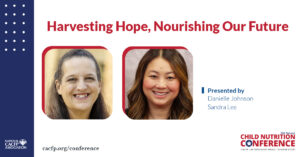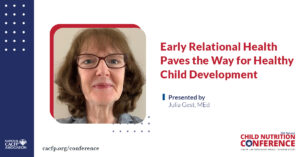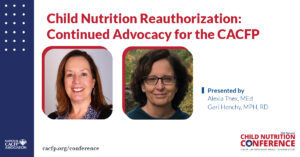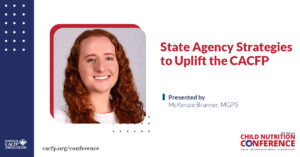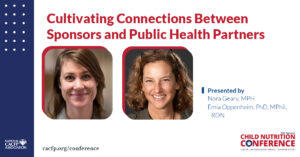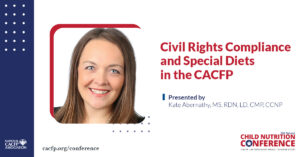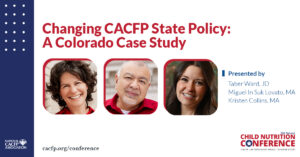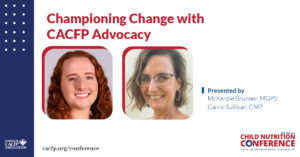2025 NCNC
The Numbers Behind the Story: Unveiling Insights with Data
Use Data to Drive Action. That’s California’s Health and Human Services team’s guiding principle. Discover how the CACFP Branch created a Data Innovation Unit to explore ways to provide data analysis to make better-informed program decisions, identify methods to measure program improvements, and create data stories connecting CACFP to the communities served.
Read MoreHunger, Health and How Early Care Settings Can Help
While hunger and nutrition insecurity pose similarities, they also have distinct differences. Additionally, a lack of access to healthy food affects early childhood development. Discover ways of increasing food security and supporting early care and education professionals to implement strategies critical for continued nutrition access.
Read MoreHarvesting Hope, Nourishing Our Future
Learn how a Harvest of the Month program can incorporate nutrition education while encompassing early education foundations. Get inspiration and a guide to hands-on activities and resources to start your own program and create a meaningful learning environment that embeds healthy habits throughout the day.
Read MoreEarly Relational Health Paves the Way for Healthy Child Development
Early relational health is a strength-based framework focusing on safe, stable, and nurturing relationships (SSNRs) between children and caregivers. As an early care professional who is uniquely positioned to support children in this area, including social-emotional learning (SEL) skill development, learn how to enhance your understanding of relational health.
Read MoreChild Nutrition Reauthorization: Continued Advocacy for the CACFP
Every five years, Child Nutrition Reauthorization (CNR) provides Congress with an opportunity to improve and strengthen the child nutrition and school meal programs. CNR last was reauthorized in 2010 when the Healthy, Hunger-Free Kids Act was signed into law. Gain an understanding of why this matters to you and how this legislation impacts the programs you operate.
Read MoreState Agency Strategies to Uplift the CACFP
There are many common and innovative strategies for promoting and expanding access to the CACFP. Implementing successful strategies at the State level can help get meals to those that need it most. Hear from a panel of State Agencies about the strategies they implement to uplift the CACFP in their state.
Read MoreCultivating Connections Between Sponsors and Public Health Partners
CACFP Sponsoring Organizations, public health practitioners and nutritionists strive to support children’s growth and development by ensuring consistent and reliable access to safe water and nutritious food. Learn how you can expand CACFP participation by creating connections with public health partners and knowing where to find resources.
Read MoreCivil Rights Compliance and Special Diets in the CACFP
What is required for a child with a food allergy or special diet need? Come and learn how to best support the needs of the child while balancing program regulations. Review real-world examples with solutions and lists of creditable foods, tools and resources while maintaining compliance with civil rights.
Read MoreChanging CACFP State Policy: A Colorado Case Study
Colorado is working across state agencies and with community members and advocates to ensure equitable eligibility processes for CACFP in the state. That starts with ensuring Family, Friend, and Neighbor (FFN) providers and the children in their care can access the CACFP. Explore Colorado’s journey to create change and hear how it could work in your state.
Read MoreChampioning Change with CACFP Advocacy
Do you want to advocate for your program or those you serve, but don’t know where to begin? Being an “advocate” can sound daunting or difficult, but it doesn’t have to be! Learn how to get started and receive resources to help you along the way. Plus, hear first-hand from your peers about their experience advocating for the CACFP.
Read More


